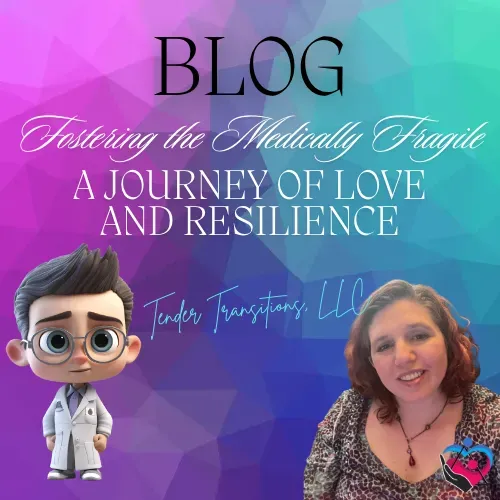Can I Be a Medically Fragile Foster Parent? Exploring the Path to Care for Children with Special Needs
dFostering a child is a profound and impactful commitment, and when it comes to medically fragile children—those with serious and often complex medical conditions—the responsibilities can be even more demanding. If you’re considering becoming a medically fragile foster parent, it’s essential to understand the unique requirements and challenges involved. This blog post will explore what it takes to be a medically fragile foster parent, the qualities needed, and the support available to help you succeed in this important role.
Understanding Medically Fragile Children
Medically fragile children are those who have chronic, severe, or complex medical conditions that require ongoing care and attention. These conditions might include serious respiratory issues, congenital heart defects, neurological disorders, or severe developmental disabilities. The needs of these children can vary widely, but they generally require frequent medical appointments, specialized treatments, and sometimes complex medical equipment.
What It Takes to Be a Medically Fragile Foster Parent
Becoming a foster parent to a medically fragile child is a significant commitment that requires specific skills and attributes:
Medical Knowledge and Skills:
You don’t need to be a medical professional, but a basic understanding of the medical conditions affecting the child is crucial. Foster parents often receive training on how to manage medical needs, administer medications, and use medical equipment.
Emotional Resilience:
Caring for a medically fragile child can be emotionally challenging. You need to be prepared for the stress and emotional ups and downs associated with managing serious health conditions and supporting a child through medical treatments.
Patience and Flexibility:
Medical care for a fragile child can be unpredictable. Foster parents must be patient and flexible, adapting to changes in the child’s condition or treatment plans.
Advocacy Skills:
Medically fragile children often require specialized care and services. As a foster parent, you’ll need to advocate for their needs, including working with healthcare providers, navigating insurance issues, and ensuring that the child receives appropriate services and support.
Training and Preparation
Before becoming a medically fragile foster parent, you will undergo extensive training and preparation:
Initial Foster Care Training:
This general training covers the basics of foster care, including child development, trauma, and the role of foster parents. This is a prerequisite before moving on to specialized training for medically fragile care.
Specialized Medical Training:
This training focuses on the specific medical needs of children with chronic or complex conditions. It includes learning about the child’s condition, how to administer medications, and how to use medical equipment. Training often involves practical demonstrations and simulations.
Home Preparation:
Your home will need to be adapted to meet the needs of a medically fragile child. This may include ensuring that the home is accessible, modifying rooms for medical equipment, and creating a safe environment for the child’s specific needs.
4. Support Systems for Medically Fragile Foster Parents
Caring for a medically fragile child can be demanding, but there are various support systems available to help you succeed:
Medical and Professional Support:
You will have access to healthcare professionals who can provide guidance and support. This includes doctors, nurses, and therapists who can offer advice on managing the child’s condition.
Foster Care Agencies:
Your foster care agency will provide ongoing support, including case management, resources, and access to specialized services. They can also connect you with other foster parents who have experience with medically fragile children.
Support Groups:
Joining support groups for foster parents of medically fragile children can provide emotional support and practical advice. These groups often share experiences, tips, and resources, creating a network of understanding and encouragement.
Respite Care:
Respite care services offer temporary relief for foster parents, allowing you to take breaks and manage the demands of caregiving. This can be crucial for maintaining your well-being and avoiding burnout.
5. Assessing Your Readiness
Before committing to becoming a medically fragile foster parent, it’s essential to assess your readiness and suitability:
Self-Assessment:
Reflect on your emotional resilience, medical knowledge, and ability to handle the demands of caring for a medically fragile child. Consider how well you manage stress and whether you have a strong support system.
Family Dynamics:
Assess how fostering a medically fragile child will impact your family dynamics. Ensure that all family members are on board and prepared for the additional responsibilities and challenges.
Long-Term Commitment:
Medically fragile children may require long-term care and support. Consider whether you’re prepared for the potential long-term commitment involved.
6. Conclusion
Becoming a foster parent for a medically fragile child is a deeply rewarding but challenging role. It requires specific skills, emotional resilience, and a strong support network. If you’re considering this path, understanding the unique demands and preparing adequately through training and support is crucial. The ability to provide a safe, nurturing, and medically appropriate environment for a child with complex needs can make a profound difference in their life and well-being. By exploring the realities and preparing thoroughly, you can make an informed decision about whether this path is right for you and contribute meaningfully to the lives of medically fragile children in need.

